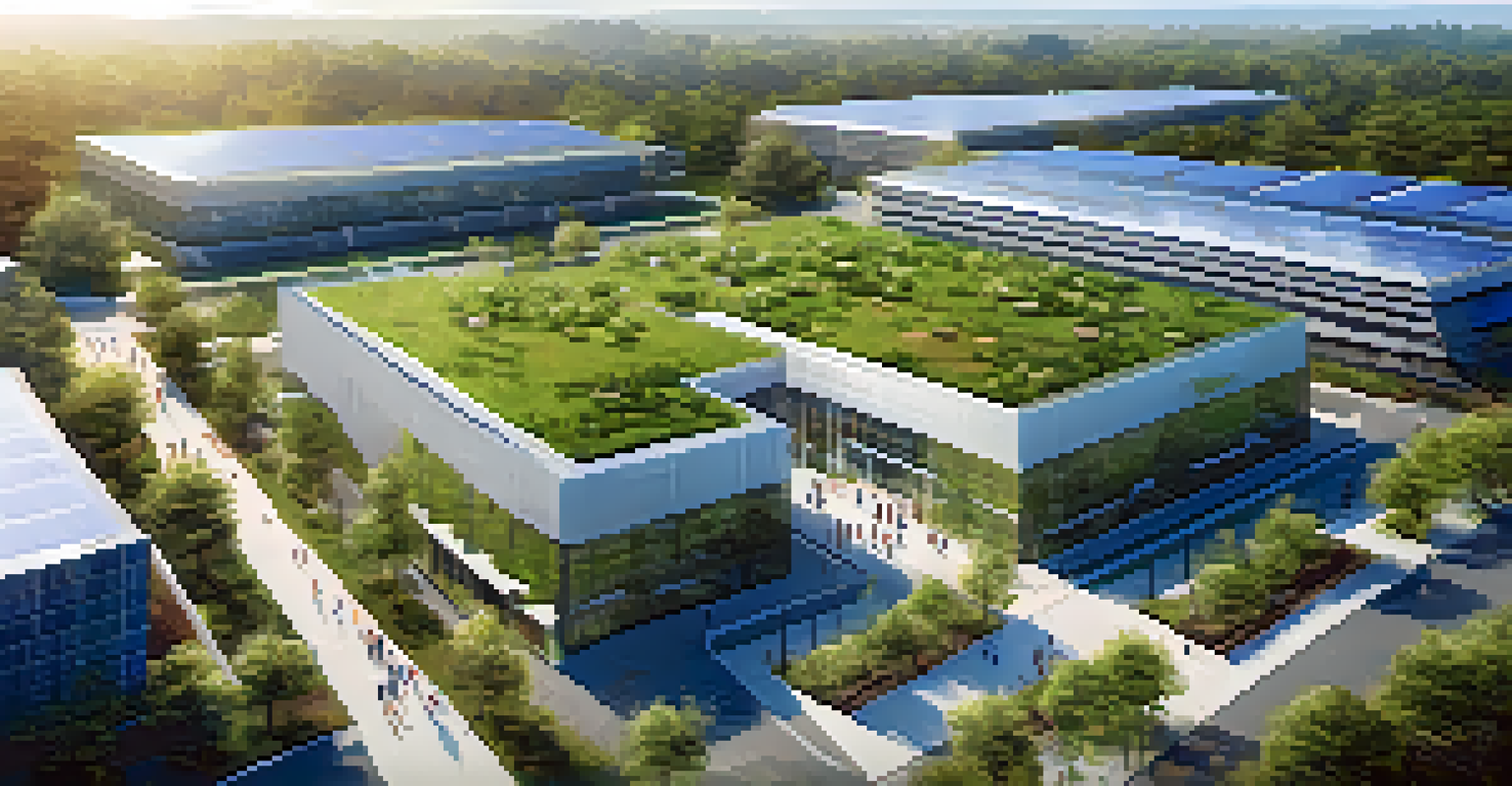The Impact of Technology Hubs on Real Estate Demand

Understanding Technology Hubs and Their Growth
Technology hubs are areas where tech companies and startups cluster, creating an ecosystem of innovation. Cities like Silicon Valley, Austin, and Seattle have become synonymous with this trend, attracting talent and investment. This concentration of technology firms fosters collaboration and networking, ultimately driving economic growth and job creation.
Innovation distinguishes between a leader and a follower.
As these hubs grow, they not only attract tech professionals but also other industries that support them, such as real estate, hospitality, and retail. This creates a ripple effect, leading to increased demand for housing and commercial spaces. Essentially, technology hubs transform local economies, making them more vibrant and diverse.
Moreover, the rise of remote work has further fueled interest in technology hubs. Professionals often seek locations that offer a combination of career opportunities and quality of life. This shift has prompted cities to invest in infrastructure and amenities, enhancing their appeal as tech centers.
The Link Between Tech Hubs and Real Estate Prices
As technology hubs flourish, real estate demand tends to spike, leading to rising property prices. This phenomenon is particularly evident in urban areas where tech companies are established. As more professionals relocate to these regions for work, the competition for housing intensifies, driving prices upward.

In many cases, this increase in demand can lead to gentrification, where lower-income residents are displaced by higher-income newcomers. This shift can alter the socio-economic fabric of neighborhoods, prompting discussions about affordability and sustainable development. Local governments and developers must balance the benefits of economic growth with the need to maintain community diversity.
Tech Hubs Drive Economic Growth
The clustering of tech companies in cities fosters innovation, collaboration, and significant job creation.
Additionally, the rising prices can attract investors looking to capitalize on the growing market. This influx of investment can further escalate property values, creating a cycle that can be difficult for some residents to navigate. Understanding this relationship between tech hubs and real estate prices is crucial for stakeholders at every level.
The Role of Infrastructure in Supporting Tech Hubs
Infrastructure plays a vital role in the success of technology hubs and their surrounding real estate markets. Well-developed transportation systems, high-speed internet access, and modern utilities are essential for attracting tech companies and their workers. Areas with robust infrastructure tend to see higher property demand due to the convenience and connectivity they offer.
The best way to predict the future is to create it.
Cities that invest in infrastructure not only enhance their appeal as tech hubs but also improve the quality of life for residents. For example, improved public transportation can reduce commute times, making an area more attractive to potential residents and businesses. This interconnection between infrastructure and real estate demand highlights the importance of strategic urban planning.
Furthermore, as the demand for housing increases, local governments must ensure that infrastructure keeps pace with growth. This includes planning for parks, schools, and healthcare facilities, which contribute to a well-rounded community. Ultimately, effective infrastructure development supports both the tech industry and the local real estate market.
Shifts in Housing Preferences Driven by Tech Jobs
The presence of technology hubs has led to significant shifts in housing preferences among tech workers. Many professionals now prioritize amenities that enhance their lifestyle, such as proximity to coworking spaces, recreational areas, and vibrant social scenes. This preference for urban living has transformed the types of properties in demand, with a growing interest in apartments and condos.
Additionally, the trend towards remote and hybrid work models has influenced where technology employees choose to live. Many are seeking homes in suburban or even rural areas, where they can enjoy more space and a lower cost of living, while still being within commuting distance of tech hubs. This change is reshaping real estate markets beyond traditional urban centers.
Rising Demand Affects Real Estate
As tech hubs expand, the increased demand for housing leads to rising property prices and potential gentrification.
As a result, developers are adapting to these new demands by creating mixed-use communities that blend residential, commercial, and recreational spaces. These developments aim to provide a balanced lifestyle for tech workers, making them more appealing in a competitive market. Understanding these shifts is key for real estate professionals looking to meet the needs of modern consumers.
The Impact of Remote Work on Real Estate Demand
Remote work has fundamentally changed the landscape of real estate demand, particularly in relation to technology hubs. While many tech companies initially sought to establish their offices in urban centers, the pandemic has prompted a reevaluation of this approach. As remote work becomes more normalized, employees are less tied to geographical locations, allowing them to choose where they live based on personal preferences.
This newfound flexibility has led to an increased interest in suburban and rural properties, where homebuyers can find larger spaces at more affordable prices. Consequently, the demand for real estate in these areas has surged, impacting local markets traditionally viewed as secondary to major tech hubs. This shift is encouraging developers to explore opportunities outside of urban centers.
Moreover, as technology continues to evolve, so too will the way people work and live. The blending of work and home life may lead to the rise of 'live-work' properties, catering to the needs of remote workers. Real estate professionals must stay attuned to these changes to effectively navigate the evolving landscape.
The Influence of Tech Companies on Local Development
Tech companies often play a significant role in shaping their local environments, influencing everything from infrastructure to housing development. As these companies expand, they frequently collaborate with local governments and community organizations to address issues such as transportation and housing shortages. This partnership can lead to improved amenities that benefit both employees and residents.
Moreover, tech giants often invest in local initiatives aimed at enhancing the overall quality of life in their communities. This can include funding for parks, schools, and public spaces, which not only attract talent but also contribute to a vibrant local culture. Such investments can create a positive feedback loop, boosting local real estate demand as the area's desirability increases.
Remote Work Shifts Housing Preferences
The rise of remote work has transformed where tech workers choose to live, increasing interest in suburban and rural properties.
However, it's essential to strike a balance between corporate influence and community needs. As tech companies continue to grow, they must remain mindful of their impact on local residents and ensure that their developments promote inclusivity and sustainability. This collaborative approach can benefit both the tech industry and the communities in which they operate.
Challenges and Opportunities for Real Estate Investors
The rise of technology hubs presents both challenges and opportunities for real estate investors. On one hand, the increasing demand for housing in these areas can lead to profitable investments and substantial returns. Investors who can identify emerging tech hubs early on may find themselves in a prime position to capitalize on growth trends.
On the other hand, the volatility of the tech industry can create uncertainties in the real estate market. Rapid shifts in market dynamics, such as changing remote work policies or economic downturns, can impact property values and demand. Investors must remain vigilant and adaptable, continually assessing market conditions to mitigate risks.

Furthermore, ethical considerations are becoming increasingly important for investors. As gentrification and affordability issues arise in growing tech hubs, investors must navigate these challenges responsibly. By prioritizing sustainable development and community engagement, real estate investors can contribute positively to the neighborhoods they operate in while still achieving their financial goals.